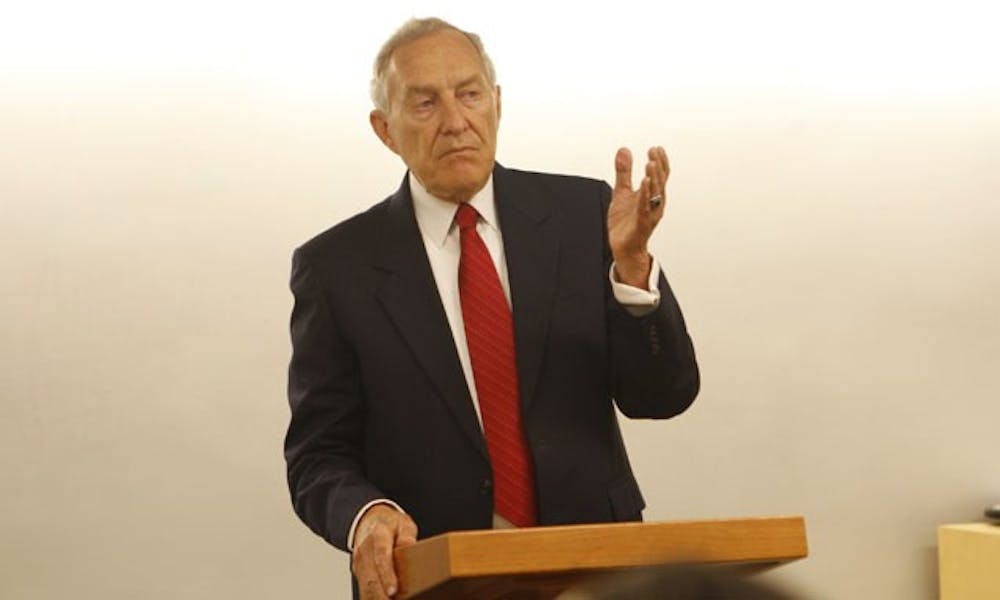Burundi, a small country located in the center of Africa, is among the poorest countries in the world. But the country’s economic woes are not the only issues it faces—about 300,000 people died there during a civil war that lingered for much of the 1990s.
Former Sen. Bob Krueger, D-Texas, who served as the ambassador to Burundi during this period, spoke at the fourth Super Tuesday event this year. Discussion centered around Krueger’s experience as ambassador to both Botswana and Burundi, where conflict between the Hutu and Tutsi tribes has contributed to a decades-long conflict that some have deemed a genocide. Super Tuesday is a speaker series hosted by the Duke Political Union.
Krueger, who was a Duke professor for 12 years, a vice provost and the dean of Trinity College, told approximately 40 students Tuesday night that American involvement in the situation was minimal, even though the number of deaths was substantial.
“Why didn’t they care?” Krueger said. “The United States and the world knew that slaughter was going on, and they didn’t give a damn.”
In addition to discussing U.S. policy in Africa, Krueger—who co-wrote the 2007 book “From Bloodshed to Hope in Burundi: Our Embassy Years During Genocide” with his wife—shared stories of witnessing the conflict.
Krueger said he asked himself every day what he could do to save the remnants of democracy and to save human lives. He shared one example when he examined two dead bodies that had been left after an army raid of a town.
“I will tell you that there is no dead steer, pig or fish that smells like a human body that has been left to rot in the sun for days,” Krueger said. “And I stood there, and I don’t know why, but I think I had to feel with every fiber of my body what it was that I was looking at... so that I could go and speak with clarity and with passion.”
He also shared the story of finding a 5-year-old child whose head had been split open by an axe and whose body was mutilated. Krueger said that although many deaths are reported as crossfire, the child’s body proved otherwise.
“This child might have been Einstein, he might have been Mandela,” Krueger said. “I don’t know what this child might have been—that child is younger than I am and that child might have done more with his life than I have with mine.”
Krueger also chronicled someone’s attempt to assassinate him while he was on a narrow mountain road, which prompted the U.S. government to try to remove him from Africa. Krueger said he objected because he felt it was important to continue to witness the genocide.
“In Texas, when you fall off of a horse you get right back on that horse... so the worst thing that you could do is to pull the U.S. ambassador out of here,” said Krueger, who said he experienced other assassination attempts. “If I remained silent, who was to speak?”
Junior Ben Bergmann, president of Duke Democrats—which sponsored the event in conjunction with Duke Political Union—said the organizations found Krueger an appealing candidate to speak because he provided non-partisan perspective on international issues.
“One of the things that we want to do is bring in people who can talk about the different dimensions of politics and public service,” Bergmann said. “And Ambassador and Sen. Krueger was the perfect person to do that.”
Senior Ruthie Tucker said she attended the event because she is taking the Violence and Identity house course, which incorporates Krueger’s speech into its coursework.
“I think as an [International Comparative Studies] major...we are already aware of the facts, but a lot of times the emotional reality of the situation is hidden in the realms of academia and you don’t really realize what’s going on in the world,” Tucker said. “And it’s really terrible when you think about it.”
Krueger said one of his goals in speaking to students is to motivate them to question how they can help improve situations—both domestically and abroad. In addition to Tuesday’s event, Krueger also spoke to students at the Visions of Freedom Focus program dinner Monday.
“I think all of those are questions that students can ask for themselves, and they should not just think, ‘Well, I don’t want to pay attention because there is nothing I can do,’” Krueger said in an interview. “There are always things that people can do.”
The notion that people need to hold themselves accountable for international problems was prevalent throughout the night.
“What can we do?,” Krueger said at the end of his address. “That is a question for each of you.”
Get The Chronicle straight to your inbox
Signup for our weekly newsletter. Cancel at any time.

